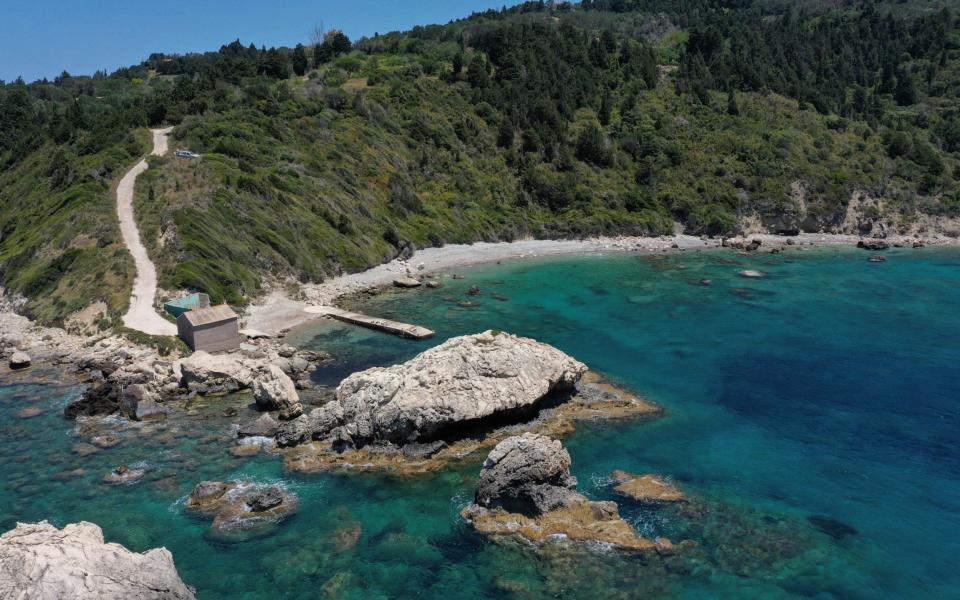As the school summer vacation period is rapidly approaching and the long-awaited “annual leave” period is getting closer, the excitement of holidaying on the Greek islands is reaching its peak: the deep blue sea; the whitewashed facades of marina-front buildings that promise ice-cold drinks; Beaches and bays that sound like sirens to all of us who are used to rain and clouds.
With their remote spots, hard-to-reach bays and magnificent headlands, the Greek islands have it all – and long journeys are unlikely to spoil the bliss.
But since the death of much-loved presenter Michael Mosley, who was found on the beach of Agia Marina on the island of Symi on June 9, five days after initially taking a simple walk alone on the beach, the news has been filled with tragic stories of holidaymakers (mostly Europeans) who died while trying to walk in the islands’ extraordinary heat.
Six more people have died or gone missing on Greek islands this month, all as a result of taking risks in “history-making” hot weather.
This week, a 67-year-old German man became the latest victim after going on a canyoning trip alone on the island of Crete, where temperatures reached 44.5 degrees Celsius. He called his wife a few hours after starting the hike to report that he was feeling unwell and was later found dead near a gorge.
Before that, on June 15, the body of a 74-year-old Dutch man was found dead in a ravine on the eastern island of Samos after reportedly struggling to walk in the heat. A day later, a missing American man was also found dead on the island of Mathraki, near Corfu – the third person to die in a week.

Meanwhile, searches continue for three tourists: two French women, aged 73 and 64, who went missing in Sikinos, and Eric Calibet, a 59-year-old retired Los Angeles sheriff’s deputy with dual French-American citizenship, who was last seen on the hike. Alone in Amorgos.
An Israeli couple living in the Vytina region in the Peloponnese has also not yet returned.
“This has always been a problem, especially for tourists coming to the islands for the first time,” said Konstantina Dimoglidou, a spokeswoman for the Greek police. “Due to the heatwave, all the cases occurred almost simultaneously over a few days, while in most other years they were spread out over the summer. Rescuers searching for Michael Mosley told me that the thermometer where he was found was 46 degrees at one point.”
In recent weeks, Greece has experienced two consecutive heatwaves, with temperatures reaching over 40C. Schools have closed and the culture ministry has been forced to close the Acropolis and other archaeological sites to visitors. Red Cross volunteers have distributed thousands of free bottles of water and the Athens municipality has set up cooling stations. But the roads on the islands, which are by nature wild and uncontrolled, remain completely unregulated.
While authorities generally warn elderly locals to stay home and drink plenty of water, tourists are given no warning about the dangers of the hike.
The latest deaths are tragic for the indigenous people living on the islands, but are also said to be unfortunately preventable. Mosley’s death shed light on the issue of hiking on the islands, but lost and often poorly equipped tourists were always a problem there, their lives always at risk from the Greek island’s derringdo. Often the tourists are found in time or redirect themselves before their energetic intentions turn tragic – but sometimes they are never found.
In all of these cases where hikers have gone missing, the weather has always been hot; tourists are often seen on the trails without hats, which has shocked locals. But experts and locals say this year the combination of unusual heat and hiking has been particularly deadly.
A resident of the island of Antiparos, who wished to remain anonymous, said: “Hiking on the islands in June is usually no problem, but this year we have seen an unusual and prolonged heat wave. For example, when Michael Mosley went missing, I think rescuers were looking for him from 40 degrees away. “It’s just unusually hot. ”
The woman, from the UK, currently lives in Athens but travels regularly to Antiparos. She adds that few tourists realise that many of the islands, especially towards southern Greece, have their own microclimates.
There is often little shade and no trees. Sometimes the breeze so longed for on a Greek island can lead to dangerous decision-making: It hides the heat, fooling tourists into thinking activities like hiking are safer than they actually are.
Walking on the islands is often tempting because the views are so spectacular and often the smallest, steepest paths can lead to the best bays or views. But the local woman warns that these small paths are often confusing and that once lost on these paths it can be difficult for a walker to get back on the correct route, as was the case at Mosley: “I think the rescue teams are doing the best they can but these walkers are often too far away.” lost in areas or on donkey trails where only monasteries and abandoned farms are located.
“There’s also often no phone signal and incredibly difficult conditions to call someone. I’ve hiked before in June, in the early morning and with a group, but really people shouldn’t be hiking alone when it’s this hot.”
Another local living in Parga, a coastal town off the Ionian Sea on the Greek mainland, adds: “Of course it’s been hotter than usual. But I think it’s cumulative. We’ve had a lot of forest fires in recent years, which destroyed all the greenery and left the islands bone dry.” and also made it more prone to flooding.
“It’s very dangerous to walk here in the summer. None of these missing people are Greek. Local people are aware of the dangers, but we don’t really understand why others can’t see it.”
“Of course, it is also important to note that the number of tourists who came to Greece last year was well over 30 million. So the deaths, although tragic, are a very small number.”
Meteorologist Panos Giannopoulos told the ERT television channel: “This heatwave will go down in history. We have never experienced anything like this in the 20th century before June 19.”
This month’s search is in stark contrast to the attempt to find John Tossell, 78, from Bridgend, who disappeared while on holiday in Zakynthos five years ago.


In a case that chillingly echoes that of Michael Mosley, the last confirmed image of him was captured on CCTV footage driving out of town towards Vassilikos, in his case passing a hotel. Greek authorities called off the search after five days, forcing daughter Katy to launch her own fundraising campaign.
Mr Tossell’s son Gary said he was disappointed in the rescue team’s efforts at the time: “They walked out. It was like a walk in the park for them. There was no intensity in their efforts. They said a team would come from Athens with dogs and experts, but for some reason it was rejected at the last minute. After five days they stopped completely. “They said he might have left the island but he had 10 euros and a bottle of water.”
Katy Tossell herself raised £7,000 and brought the money to Zakynthos to help Western Beacons Mountain Rescue continue their search, but they called off the search after seven days and the family are yet to find answers.
On the other hand, Michael Mosley’s case attracted attention in the international media. He was a high-profile British television personality. Could this be why the search is so different from John Tossell? Or perhaps Greek authorities had learned a lesson from numerous near-death incidents?
“When I read the story it’s like a cut and paste of my dad,” Mr Tossell’s son Gary told Sky News after Michael Mosley’s disappearance. “He went for a walk and just disappeared. Same story but different person.” John Tossell’s family suspect foul play. Despite being 10 years older than Mosley and dying of natural causes, they are at a loss to understand why his body has never been found.
In Mosley’s case, the search involved patrol boats, divers, helicopters, firefighters, police, drones and a search dog, but it still took five days to find the 67-year-old man’s body. The 74-year-old Dutch national also had extensive: a rescue team, four drones, a detection dog brought from Athens and a Frontex EU border agency helicopter. The difficulty comes from the terrain.
Dimitris Katatzis, who led the team, described a common danger that mirrored Mosley’s mistake: “walkers straying off the path.” But is it enough that Greece frequently sends out extensive search parties when the worst has already happened? Mosley died a few hours after setting out, on the first day he was missing.
‘These roads need to be looked at’
“I would like more CCTV cameras and illumination of these paths,” said Symi Mayor Eleftherios Papakalodoukas. “If there’s a lesson to be learned from this tragedy, it’s [of Mosley’s death]“These trails need to be better maintained so people don’t get lost.” For example, it wouldn’t be that difficult or expensive to install a series of arrows to keep hikers pointed in the right direction.
A municipal councillor on the island of Chios has also called for a better framework to support this type of tourism. Local walking clubs, which organise regular trips to remote areas, have a unique understanding of the nature of the trails. If the clubs were better supported through funding and technology, their input could be used for the greater good of the island, both educating and protecting keen tourists, avoiding high-profile tragedies, and boosting the island’s economy by encouraging visitors.
There is also advice for hikers: pay attention to the temperatures and carry a phone. The 74-year-old Dutch hiker’s phone was found to be off, and yet Kalaitzis, a member of the local branch of the Hellenic Rescue Team, described the route he is thought to have taken in southwestern Samos as “challenging”. Kalaitzis said he had only a small bottle of water with him when he set out on the hike, according to the man’s wife. Mosley carried an umbrella for shade but did not have a phone with him. Of the two women who went missing on Sikinos, the island’s mayor, Vassilis Marakis, told Greek television that one had her phone off and the other had none.
These latest cases all point to a helpful message for intrepid tourists on the wrong side of 50: You’re never too old to seek travel advice, because, as the tragic deaths in Greece show, mom and dad don’t always know best.